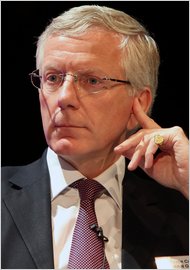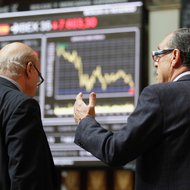LONDON – Invensys, the British maker of industrial control products and software that has long been the subject of takeover speculation, is in talks to be acquired by Schneider Electric of France for about $5 billion. But investors are indicating that they expect a competing offer.
Schneider, which provides low- and medium-voltage electrical equipment and services, offered to pay 5.05 pounds a share in cash and new shares for Invensys, valuing the company at 3.3 billion pounds, the company said late Thursday. While the talks are at an early stage, Invensys said it was likely to accept such an offer.
“The board of Invensys has indicated to Schneider that it is likely to recommend a firm offer at the offer price,” Invensys said in a statement.
The proposed price is 15 percent above Invensys’s closing share price on Thursday. The company’s shares jumped 16 percent, to 5.1 pounds, in London on Friday on expectations by some investors that Schneider would increase the offer or face competition from another bidder. Shares of Schneider fell more than 4 percent in Paris.
According to takeover rules, Schneider has until Aug. 8 at 5 p.m. to make a formal offer.
Invensys has been considered a takeover target since at least last year when takeover discussions broke down with Emerson Electric, which is based in St. Louis. Invensys had been shackled by pension liabilities of more than $700 million at the time. But the company sold its rail-infrastructure business to Siemens of Germany in May, which not only allowed it to ease its pension burden but also made it a more attractive takeover target. In addition to Schneider, other potential suitors could include General Electric and ABB, analysts have said. G.E. and ABB declined to comment.
Juho Lahdenpera, an analyst at Nomura, said Invensys was the most obvious takeover target in its industry and that it was unlikely that Schneider’s takeover approach would touch off a wave of other deals in the sector.
“Valuations are quite high and managers are generally still hesitant because of the economic situation,” Mr. Lahdenpera said. He added that he was skeptical that another bidder would emerge for Invensys. “It’s a full price, fair for Invensys and given what Schneider can do with these assets, it would be surprising to see another bidder,” he said.
Schneider said last summer that it was back on the acquisition trail after completing and integrating a string of takeovers that included companies in Spain and India. It said the strategic and financial rationale for buying Invensys was “compelling” and that an “enlarged group would significantly expand its access to key electro-intensive segments.”
A takeover would give Schneider access to Invensys’ large customer base in the oil and gas industries for which it provides control and safety systems. Invensys also sells heating and ventilation controls to large manufacturing companies as well as room thermostats and other temperature control systems to private households.
Schneider’s products include emergency lighting, fuse switches, weather observation hardware and charging devices for electric vehicles. Schneider said it expected the takeover would create “significant cost savings.”
Article source: http://dealbook.nytimes.com/2013/07/12/bid-for-invensys-gives-investors-appetite-for-more/?partner=rss&emc=rss



